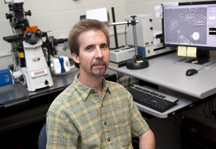Science on Tap talk aims to unravel mysteries of nerve cells
April 10, 2014
 |
|
Peter Hollenbeck |
WEST LAFAYETTE, Ind. - Purdue University biological sciences professor Peter Hollenbeck at next week's Science on Tap will unravel the mysteries of nerve cells and how they could lead to a better understanding of, and to cures for, countless disorders and diseases.
The talk, titled "Mitochondria: They Invaded Our Cells a Billion Years Ago and Now They're Running The Show," is at 6 p.m. Thursday (April 17) in the upstairs of Lafayette Brewing Company, 622 Main St., Lafayette.
The informal lecture, which is free and open to those 21 and older, is sponsored by the Purdue Department of Biological Sciences, College of Science and Discovery Park.
"Almost all degenerative diseases involve something going wrong at one end of the cell, the synapse, which in turn impacts a function the cell originally was meant to provide," said Hollenbeck, who also is associate department head of biological sciences at Purdue.
"Someday, the things we're doing in the lab could lead to a more complete understanding of the pathophysiology of these diseases. Our work should at least throw up targets for prevention or treatment, too. It could be very soon that we see these results, or it could be 10 years down the road."
One of most curious features of our bodies' cells is the presence of intracellular organelles called mitochondria, Hollenbeck said.
Research into mitochondrial biology has focused on how they are transported over long distances within our cells, how they grow, divide and fuse, and their roles in the pathophysiology of disorders such as Friedreich ataxia and Parkinson's, Alzheimer's, and Huntington's diseases.
Mitochondria arose a billion years ago when a very early eucaryotic cell engulfed a respiratory bacterium, and the relationship became stable, permanent and profoundly symbiotic, he said. They are known for their oxidation of carbohydrate foodstuffs all the way to CO2, by which they generate at high efficiency the chemical fuel of our cells.
They also play roles in macromolecule synthesis, control of ion levels, and programmed cell death, he said. Remarkably, during their co-evolution with the cell, mitochondria have retained a small genome and replicate independently of our nuclear genome, thus, we receive all of our mitochondria from our mothers, via egg cytoplasm, he said.
"As an unfortunate corollary to their efficient oxidation reduction system, they generate most of the damaging free radicals produced in our cells," he said. "As a consequence of all these properties, mitochondria have recently become appreciated as central factors in human performance, aging, neurodegeneration and a variety of diseases."
Hollenbeck, who received his doctoral degree in biology from the University of California, Berkeley, won the Charles B. Murphy Award for Outstanding Undergraduate Teaching at Purdue in 2013, the Biological Sciences Graduate Student Mentoring Award for 2011-12 and the Top Teacher in College of Science Award in 2008.
He also serves the national Tourette Syndrome Association as a scientific adviser and public speaker, coordinating research funds for neuroscientists, geneticists and clinicians whose work holds promise for understanding and curing Tourette Syndrome.
Science on Tap, led by graduate students David Welkie, Anju Karki and Nelda Vazquez, provides Purdue faculty and collaborating researchers the opportunity to share research activities in an informal setting with presentations that are designed to appeal to a more general audience. Attendance at the monthly event has averaged 80 during the program's first four years.
Writers: Phillip Fiorini, 765-496-3133, pfiorini@purdue.edu
Amanda Hamon Kunz, 765-496-1325, ahamon@purdue.edu
Sources: Peter Hollenbeck, 765-496-3378, phollenb@purdue.edu
David Welkie, 765-494-0560, dwelkie@purdue.edu
Nelda Vazquez, 765-496-1487, nvazque@purdue.edu
Anju Karki, 765-494-0455, akarki@purdue.edu
